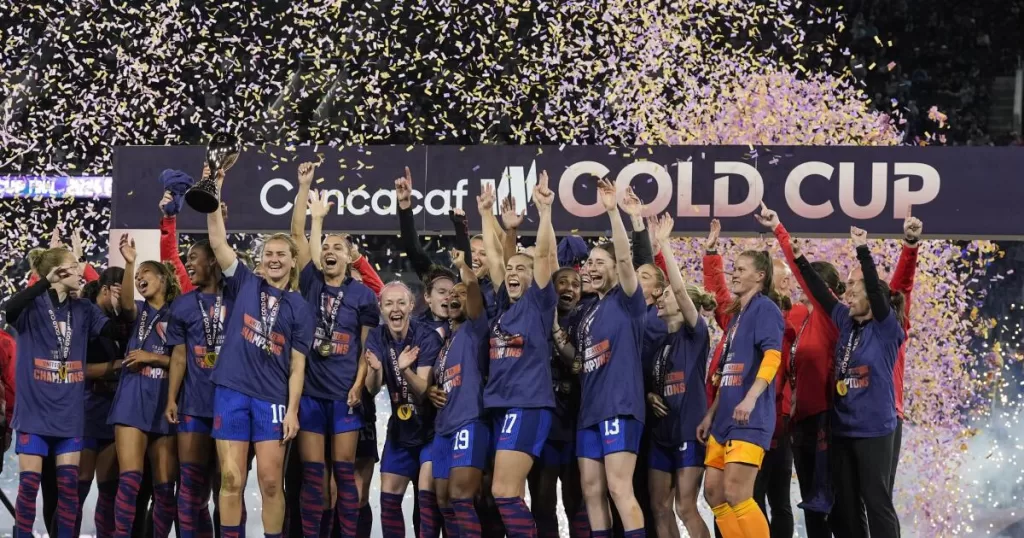“We have all together owned our World Cup experience,” said interim coach Twila Kilgore, who was an assistant on that team. “We’ve regrouped, we’ve set new goals, we’ve set a new solid plan. We’re working towards something together, and it’s a very public process. And that’s just not easy.”
What they’re working toward is a gold medal this summer in Paris, where they will face the strongest field in Olympic history just 50 weeks after the World Cup disappointment. And they took a big step toward that goal Sunday, beating Brazil 1-0 to win the first CONCACAF W Gold Cup.
But winning the tournament wasn’t nearly as important as how the U.S. won it. After losing to Mexico in group play, the Americans had to out-physical a feisty Colombia, then beat Canada in a monsoon — twice blowing one-goal leads before winning on penalty kicks — just to reach the final against Brazil.
“It’s not always pretty,” defender Naomi Girma said. “Just find a way to win.”
If that becomes the new motto of the women’s national team, it’s one the women have already embraced. This was a team that used to pound opponents, but those days are gone. The rest of the world has caught the U.S., so now it’s about grinding out wins; it’s about being smarter, being tougher and wanting it more. All those traits were on display in the Gold Cup.
“Grit is a big part of our DNA,” Kilgore said. “It’s not always a narrative that people celebrate all over the world, [but] it’s definitely a part of who we are.”
The only goal Sunday came seconds into first-half stoppage time when captain Lindsey Horan slipped between Brazilian defenders Antonia and Gabi Portilho to nod home a well-placed Emily Fox cross at the far post. And while Brazil dominated the possession battle and outshot the U.S. 11-7, the South Americans never put a shot on goal.
Grit carried the day.
“We’re just battle tested. We’re resilient,” midfielder Sam Coffey said. “I don’t think a lot of teams could lose the way we did against Mexico but respond the way that we did. I’m not sure we get here without that loss.
“We’re a team that just takes all the good, all the bad. We’re proud of all the things we’re not, and use it together for our good.”
It’s also a team in transition. The team the U.S. took to the Tokyo Olympics three years ago averaged nearly 31 years of age, making it the oldest in the tournament. The team the U.S. used Sunday included eight players under the age of 26 and two — teenage forward Jaedyn Shaw and midfielder Korbin Albert — who were too young to join their teammates in the beer-drenched victory celebration afterward.
That makes the Olympic journey a new experience for many.
“Some of the less experienced players, they’ve never played in a stadium with 31,000 [fans], with a trophy on the line,” Kilgore said. “It’s just such a valuable experience. We’ve talked about squeezing everything we can out of these games, and it’s all coming with us.”
Shaw, who led the U.S. with four goals and was named the Gold Cup’s best player, certainly made a case she belongs on the Olympic team, as did Albert, Coffey and defender Jenna Nighswonger. All four came into the tournament with fewer than 10 international caps; for them the 12-team, 19-day Gold Cup was an important dress rehearsal.
“This replicates almost exactly what an Olympic tournament will be like,” said Naeher, who has played in the Summer Games twice. “For players who have never experienced that before, this is huge. And it’s even because we still wanted to win this too. It’s not like just an experiment.
“Having that experience of being in hotels, being on the road, being together for 30 days playing six games in three weeks, it’s not an easy thing to do. We had to find a way to win, we had to dig deep as a group. And I think those are important lessons.”
For those young players to make the team, however, it will require leaving someone else off. The U.S. had 23 women on its Gold Cup team, but the Olympic roster will be limited to 18, meaning a number of players who made the World Cup trip won’t be going to Paris.
Those cuts won’t be up to Kilgore though. She has just two games left as interim coach — both in next month’s SheBelieves Cup — before Emma Hayes takes over as the permanent coach after Chelsea’s club season ends in May. Hayes will manage the team in a pair of friendlies against South Korea in early June before settling on the Olympic roster ahead of two send-off games in July.
She will then coach her first competitive game for the U.S. in France, seeking to get the Americans back to the gold medal game for the first time in 12 years. And for the U.S., making the championship match seems to be the key since Sunday’s win marked the team’s 10th consecutive win in a tournament final.
It fell well short of that in the last two Olympics, going out in the quarterfinals in 2016 before finishing third in Tokyo. Then came last summer’s World Cup debacle.
Horan, who played in all three of those tournaments, said those results haven’t been forgotten. But a win like Sunday’s, she added, makes it easier to move beyond them heading toward Paris.
“Obviously, there’s that confidence piece,” she said. “You win a major tournament going into another tournament, that’s always lovely. But there’s still a lot of hard work that we’ve got to do.
“We’ve got to keep grinding, with the forefront being we’re preparing for an Olympics.”
